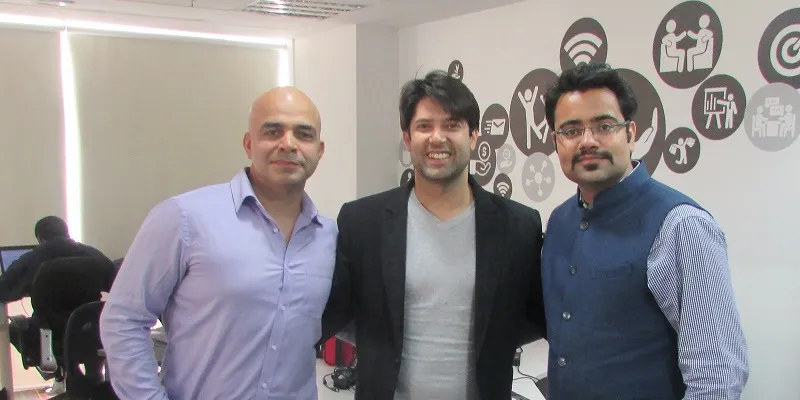Talocity makes hiring easy by helping recruiters screen potential candidates through video CVs
Talocity works as a one-stop shop for job seekers and recruiters by making the process of giving interviews, screening, and analysis easier.
For 36-year-old Sushant Patil, who was between jobs, the daily hassle of finding companies hiring, and commuting to job interviews was getting cumbersome. Not only was the task of travel time-consuming, it also was creating a dent in his pocket. Like him, many other job-seeking professionals find the commute and wait for job interviews challenging. And the cost isn’t just for the individual; the recruitment process is a costly and time-consuming affair for companies too.
It was looking at this problem that 39-year-old Ketan Dewan started Talocity, a software-as-a-service (SaaS) platform in 2011. Working as a one-stop shop for all recruitment needs of companies, the platform helps them reduce their recruitment costs and get quality talent on time.

What does it do?
Talocity uses scheduling bots to source one-way video interviews, help in pre-screening using video analytics and AI, scheduling telephonic interviews and with the final face-to-face ones. Ketan, who is a Cass Business School alumnus, notes that the platform also provides personality reports across 48 attributes for any candidate based on video pitch inputs. The services range from Rs 200 to Rs 1,500 across various combinations as chosen by the client.
The concept of Talocity started in a feature phone era. For the team the fact that job-seekers and recruiters could have a discussion before they physically met was compelling. While it knew videos were the only way to handle it, the team knew the network bandwidth didn’t support this idea.
So the firm decided to focus on pre-screening and scheduling interviews. And when the network and bandwidth began to increase, it came up with the idea of a talent stock exchange experience.
Helping both sides
Just like in a stock market, a talent stock exchange affords recruiters the option to view and hire rather than interview and hire. “The Eureka moment was when we started getting meaningful analytics from video interviews, including gesture results, profile analytics, personality rating etc., all translating into a relevancy score for the job-seeker to every job they applied for,” says Ketan.
For the job-seeker, Talocity works as a personal interview manager giving one the power to choose where you want to work. Employers can pick the candidates to approach and pay for a meeting by watching videos uploaded by them.
“In the HR services space, there are various companies offering services such as souring of CVs, technology to match job description to CV, assessments, video CVs, video/audio interviewing solutions etc., but there is no single player that offers all the services to its clients integrated through a technology platform,” says Ketan.
This gap, he adds, results in organisations having to pay vendors without any assurance on quality and therefore increasing their cost per hire.
Even Recruitment Process Outsourcing (RPO) companies, at best, deliver on robust processes that run on SLAs. However, the market's unmet need requires an intelligence-driven process to pick assessed candidates.
Working a differentiator
Currently, there is a strong and growing market for HR tech in India. Between 2015 and 2016, over $69 million has been pumped into the space. Some of the companies in the space include Greythr, Better Place, Niyo Solutions, and Quikr-acquired Hiree.
In the video interviewing space, in India, there is Interview Air and globally, there are key players like Montage Interview, InterviewStream, and Jobvite, to name a few.
Speaking of the differentiator from other platforms, Ketan says that Talocity has a deep core competency of matching one-way video interviews with one-way video JDs, applying machine learning algorithms to translate into better and relevant matching, which is real — as videos are real. Ketan claims,
The competition is either built on text CV to JD matching or does not have video analytics the way we do, which will play a crucial role in our growth story. We are ahead of the game in thought and development and hence even the largest players will take 12 to 18 months to catch up with us while we would have moved ahead in that time.
The team
The first person Ketan on-boarded was his childhood friend Dilpreet Singh. The duo had met after a gap of 19 years, at a school reunion. Ketan was then a partner at a leading HR company, and 39-year-old Dilpreet was a senior executive at a startup, after a long corporate career across hospitality and ITES sectors. Discussing the idea further, the duo decided to work together. Knowing that they needed someone with strong technical background, they roped in 24-year-old Rajat Suneja, as the tech head.
A challenge the team faces is creating awareness about the concept of one-way video interviews and adoption for employers rather than job-seekers. The team currently claims to have over 20,000 one-way video interviews and over 100 job-seekers who engage with the video platform on a daily basis. The team has raised a seed round of funding and is in the process of raising its next round of funding.
Future plans
The team is looking to organically expand into UK and US this year and are is also looking at partnerships with global HR ERP players to provide agile solutions to their existing clients and thereby build a strong distribution network.
“We will integrate ourselves with a key messaging app to support access of video pitches from people without downloading our app,” adds Ketan.







